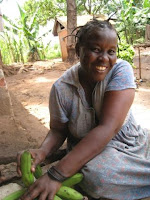Happy 30th Anniversary Mom and Dad! This blog entry has nothing to do with that, but I first wanted to commemorate this momentous anniversary, and let them know that I love them and am so proud of their lasting marriage.
The community I am living with is such an inspiration to be around. Living in this house for the next 3 months might just be “boot camp for being a really awesome person.” So far there are 5 of us, but it will be rotating about every 2-3 weeks with new people. Just call it the Real World: Uganda, minus the raunchy rendezvous.
Randy and Rachel Stroud live here as staff members, and have set the welcoming tone for our house (and no, we do not live in a hut, it’s actually very luxurious with electricity and running water). They have so much wisdom about LGH and compassion for the women of Suubi. And because this non-profit is only 2 years old, both R & R are continually brainstorming ways we can improve the operation and meet more of the needs of these women. I’ll be spending the whole 3 months with this lovely Montrose couple. Plus they’re super good at living room badminton.
Heather will be leaving us in just one week, but she has been transformed into an Acholi women. She has learned the tribal language so well. Heather is here on an environmental studies internship. She is doing research on how the conflict in the North has affected the agricultural practices of the Acholi women. Acholi-land in Northern Uganda, used to be so fertile it was called “The breadbasket of Eastern Africa.” But after being untouched for 20 years, most of the land has overgrown into the bush. But she’s learned that it’s not just the land that suffers. These women used to be able to grow all the food they needed to survive. Now they have to buy their food in the market and it is much more expensive, much less accessible, and since they’ve lost their ancestral farming skills, they have to learn a new way to provide for their families. I’m grateful that Heather has so willingly given me advice before she jets off.


(Randy-L, Ryan-R, Suubi Women-Way R) (Rachel-L, Heather-R)
Ryan is just visiting for a couple weeks. He is on the board for LGH, and has the special privilege of being introduced to the women as “Dave’s best friend” which usually leads to a round of applause. It’s pretty cool that Ryan and Dave Hansow knew each other as teens pumping some iron at Grand Junction Athletic Club, and now they are heading up (along with Morgan of course J) this brave venture. I applaud Ryan because he came over here to gain a better perspective of the Uganda side of things for making decisions back in the States.
But that’s not all; we live with 4 amazing Ugandans! Betty is the House Girl who brings such joy to the house. She is always laughing at us “Aunties and Uncles.” She is an incredibly smart woman who is raising her son, Kimbi, as a single mother while keeping this full time job and going to school. Her 13-year-old cousin Sharon joined the house this year. Sharon’s laugh can be heard all across the yard. She is such a strong kind little women. George guards the house at night. He truly breaks the mold of the traditional Ugandan man. George rides his bike 8 miles to work every day, and comes early and stays late. George isn’t armed he just carries a dull machete, but it’s nice to know another set of eyes are keeping watch over us.
This Real World group may not be full of scandalous entertainment, or dramatic chat-fights; but it is sure to uplifting, and a lot more “real” that what MTV can portray.

(Me at my First Suubi Meeting)






































